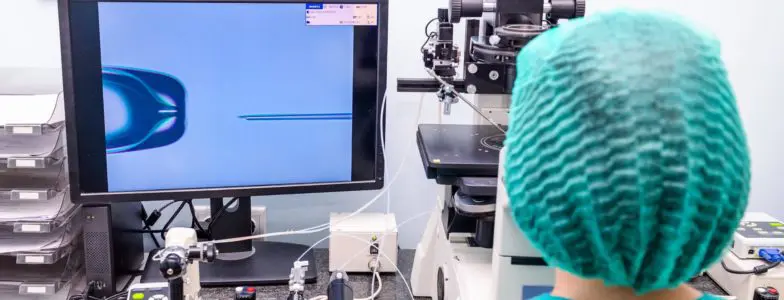Teaching about Reproductive Technologies

If an obscure, small-town Jewish rabbi tells his congregation what Judaism teaches, is that national news? What about if a Buddhist monk preaches the teachings of Buddhism? Or if a Hindu guru explains Hinduism to his followers?
It seems quite obvious that there is nothing noteworthy about any of these scenarios. And yet, for some reason the mainstream media has a strange habit of running breathless stories reporting how some Christian pastor or Catholic priest taught his congregation something that Christianity teaches and has always taught, as if this were of international importance.
Take this story published recently by the Canadian Broadcasting Corporation (CBC), Canada’s state-funded national news agency, titled “Cape Breton mother angry after church newsletter calls IVF immoral.”
In summary, a Catholic parish in North Sydney, Nova Scotia, put out a parish newsletter in which they briefly explained what the Church teaches about artificial reproductive technologies. The newsletter, which was posted to the parish’s Facebook page, explained that the Catholic Church opposes IVF (in vitro fertilization) and artificial insemination, “because they dissociate procreation from the act with which the spouses give themselves to each other and so introduce the domination of technology over the origin and destiny of the human person.”
The parish then directed parishioners to the Catechism of the Catholic Church, paragraphs 2373-2377. The Catechism was first published in the 1990s, and anyone who ever wanted to know what the Catholic Church officially says about IVF or artificial reproductive technologies could have looked it up in these paragraphs at any point.
If you are wondering how this is news, you are not alone. “Catholic Priest Teaches Catholic Teaching” is about as newsworthy a story as one titled “The Pope is Catholic.” Even more odd, however, is that the “angry” mother mentioned in the headline in the CBC article isn’t even a member of the parish, or a Catholic at all! She’s a nonreligious woman, who had a child through IVF, and who somehow came across this parish’s newsletter on Facebook, and decided to take offense at it, decrying it as “hate speech.”
A Grave Misunderstanding
This peculiarly modern habit of reacting to any statement about moral principles as “hate speech” is deeply troubling. However, reading the various articles about this parish’s bulletin did drive home how deeply people misunderstand what the Church has to say on this matter, and how much education is needed.
“No child is immoral,” protested one woman, a mother of a 20-month-old child who was conceived with IVF. This same theme came up repeatedly. Another woman (also not a Catholic) who was organizing a protest at the church, said she was protesting, “just really [to] demonstrate that obviously these children are not immoral and neither are these families.”
However, not only is this a misunderstanding of the Church’s teaching on IVF, but it is also perhaps the worst possible misunderstanding. The Church’s teaching on artificial reproductive technologies not only does not say that the child conceived is “immoral,” it also places the complete emphasis entirely on preserving the rights and dignity of the child!
Paragraph 2378 of the Catechism reads: “A child is not something owed to one, but is a gift. The ‘supreme gift of marriage’ is a human person. A child may not be considered a piece of property, an idea to which an alleged ‘right to a child’ would lead. In this area, only the child possesses genuine rights: the right ‘to be the fruit of the specific act of the conjugal love of his parents,’ and ‘the right to be respected as a person from the moment of his conception.’”
There are no “immoral” children. Children conceived through IVF are precious in the sight of God, as are all children. Even though the means by which they were conceived are immoral, they are loved by God and should be loved and cherished by us as well. What the Church is concerned about is that the inner logic of IVF and similar technologies conduces viewing a child as a right, rather than a privilege; as a commodity, rather than a gift; as a thing to be bought according to specification, rather than welcomed and embraced without any conditions.
In a statement to CTV News, Bishop Wayne Kirkpatrick of the Diocese of Antigonish, Nova Scotia, noted that
“all children, regardless of the circumstances of their conception and birth, should be loved, cherished and cared for. A child conceived in vitro is welcomed by God and the Church.
“The reason that the Church opposes in vitro fertilization is that it can treat the child and couple as if they were part of a manufacturing process. There are concerns about the loss of embryos and the use of reproductive technology for selection rather than creation. The Church’s teaching is out of concern for children and families.”
Well put!
The Objective Problems with IVF
Recently I came across two stories. One story involved a couple who decided to get one of those popular DNA tests for themselves and their two sons. However, when the results came back, they were shocked. The test showed that one of their sons, who was conceived using IVF, was not biologically related to his father. As it turns out, the lab had used sperm from another, unknown, man to create the child. The couple had to break this news to their son. In the end, they also tracked down the true biological father, who in turn had to tell his three children that they had a half-brother, born by accident to another family.
The second story, similar to the first, involved another mix-up at an IVF clinic. The result was that two couples accidentally carried the child of the other couple. The couples only began to suspect that a mistake had been made at the moment of birth, since the children looked so different from themselves. But they only found out the truth for certain a month later. By that point, the parents had already bonded deeply with the child they had carried and given birth to. The children were eventually swapped, but one of the couples described the process as a moment when their “world started falling apart.”
These heartbreaking, shocking, and disturbing stories are a foreseeable consequence of allowing human technology to intrude so deeply into something as delicate and sacred as the engendering of new human life.
It goes without saying that many spouses who, because of a high incidence of infertility in our society, resort to IVF or other similar technologies do so because of an understandable natural desire to bring new life into the world. It also goes without saying that these parents dearly love their children.
However, nothing that the Church says about IVF or artificial reproductive technologies in any way calls into question the worth or dignity of the child or the love of the parents for that child. Instead, the Church’s teaching simply points towards certain objective facts about the IVF process that cannot be ignored, like the harm done to the marital union and to the couple themselves. Children are to be conceived, engendered exclusively through the physical expression of love between a husband and wife. With IVF, however, technicians perform the actions that bring about life, rather than the husband and wife. This act goes against God’s plan for marriage and the way children are to come into the world.
Another important fact, briefly mentioned by Bishop Kirkpatrick above, is that the IVF process often involves the generation of multiple embryos. As a consequence, there are literally millions of embryos, frozen in labs all around the world. Scientifically speaking, these are genetically unique, living human beings, in the earliest stages of development.
Eventually, these tiniest of human beings will be placed in the uterus of their respective mother with the hope that at least one will implant, come to term, and be born. In most cases one child is desired by a couple, so the doctors will kill one or more of the children in the womb, arbitrarily determining which child lives or dies. And, if it happens during the process that one or more of the children are not healthy or are not developing properly, their lives will be terminated, discarded like waste. The “leftover” children, the ones not utilized, are either killed or are experimented upon, while others are frozen in liquid nitrogen for future implantation or experimentation.
This is no way to treat human life. Children are not commodities to be produced for adult needs and commercialization. And regardless of the intentions of the people involved, it is gravely, deeply, intrinsically immoral. There is simply no way to sugar-coat this objective reality. For this reason alone, IVF must be rejected as unconscionable. And the Church has a duty to warn her flock, and the culture, away from this practice.
While welcoming Bishop Kirkpatrick’s excellent statement quoted above, there is one area where I respectfully disagree with him. In the CBC article the bishop was quoted as saying that it was “unfortunate” that the priest put the teaching about IVF in the bulletin, because “people are hurt, and I understand they’re hurt.”
In reality, I can think of few things less controversial than putting a brief summary of Catholic teaching on a highly pertinent topic in a parish bulletin. There are many couples who have had a child by IVF, and there are individuals who know someone, a family member, friend, or colleague, who has had a child through this process, making education and formation on this issue necessary. Many do not understand why or know better, which makes it all the more important for pastors to guide the flock entrusted to their care, affirming the goodness of these children and teaching why this process is immoral.
I hope that the controversy will be used by the pastor and the diocese (and the larger Catholic community) to present people with the Church’s wisdom on the sanctity of human life and the dignity of marriage and the conjugal act. In the meantime, let us pray for all pastors that they will not lose courage as they tend to God’s flock, and will continue to stand up in defense of life and marriage, regardless of the cost.




Dear Father Shenan,
Your words not only reflect an exquisite eloquence of embracing the Culture of Life and Agape ( God’s Love) but is also a testament to the “truth and discernment” of this moral, cultural and spiritual moment-affirming every child as a gift from God! May God bless you and HLI a thousand fold in your crusade for truth, love and life.
Sincerely,
Dr. Mario
Fr. Shenan, you have given me a great resource for teaching. I am in in-person ministetial ” drydock” because of my chemo treatments for cancer until probably the beginning of 2023. However, I am serving as a theological and spritual advisor to various Cursillo groups arond the world. My “flock” are in Argentina, Chile, Ecuador, Peru, Guatemala, El Salvador, Mexico, U.S., Canada, Portugal, Spain, Italy, and Ireland. Many blessings in your invaluable ministry in defense of life and the dignity of the human person. Adolfo keeps me posted on HLI activities. On this Thanksgiving weekend, I give thanks for HLI and leadership throughout the world. “Let us give thanks to the Lord for He is good. His mercy is everlasting”. Fr. David Smith, Miami
God bless you Fr. Smith! Continue your faithful service to the Lord.
Dr. Mario
Great article, which is why the church needs to promote Natural Procreative Technology as a moral and effective alternative to these ARTs. Visit fertilitycare.org to find providers near you.
Keep your religious beliefs out of government policies! I don’t care what religion anyone subscribes to…keep your beliefs out of our laws! If you or any other religious groups supports candidates or tells members who to vote for you should be forced to pay taxes!
Very clear teaching, Father. Thank you.
Thank u for this article. You explained so well! I hope all Catholics and even those who disagree could read it. Another subject u might touch upon is the adoption of the embryos that are frozen. I know of Christian couples who can’t conceive and have adopted a frozen child and then have given birth.